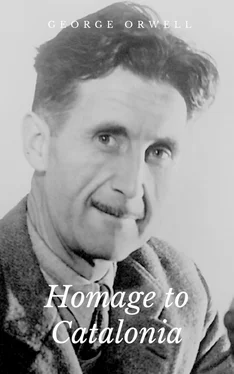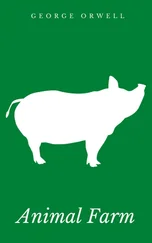And beyond this there was the complete lack of war materials of every description. It needs an effort to realise how badly the militias were armed at this time. Any public school OTC in England is far more like a modern army than we were. The badness of our weapons was so astonishing that it is worth recording in detail.
For this sector of the front the entire artillery consisted of four trench-mortars with fifteen rounds for each gun. Of course they were far too precious to be fired and the mortars were kept in Alcubierre. There were machine-guns at the rate of approximately one to fifty men; they were oldish guns, but fairly accurate up to three or four hundred yards. Beyond this we had only rifles, and the majority of the rifles were scrap-iron. There were three types of rifle in use. The first was the long Mauser. These were seldom less than twenty years old, their sights were about as much use as a broken speedometer, and in most of them the rifling was hopelessly corroded; about one rifle in ten was not bad, however. Then there was the short Mauser, or mousqueton, really a cavalry weapon. These were more popular than the others because they were lighter to carry and less nuisance in a trench, also because they were comparatively new and looked efficient. Actually they were almost useless. They were made out of reassembled parts, no bolt belonged to its rifle, and three-quarters of them could be counted on to jam after five shots. There were also a few Winchester rifles. These were nice to shoot with, but they were wildly inaccurate, and as their cartridges had no clips they could only be fired one shot at a time. Ammunition was so scarce that each man entering the line was only issued with fifty rounds, and most of it was exceedingly bad. The Spanish-made cartridges were all refills and would jam even the best rifles. The Mexican cartridges were better and were therefore reserved for the machine-guns. Best of all was the German-made ammunition, but as this came only from prisoners and deserters there was not much of it. I always kept a clip of German or Mexican ammunition in my pocket for use in an emergency. But in practice when the emergency came I seldom fired my rifle; I was too frightened of the beastly thing jamming and too anxious to reserve at any rate one round that would go off.
We had no tin hats, no bayonets, hardly any revolvers or pistols, and not more than one bomb between five or ten men. The bomb in use at this time was a frightful object known as the 'FAI bomb', it having been produced by the Anarchists in the early days of the war. It was on the principle of a Mills bomb, but the lever was held down not by a pin but a piece of tape. You broke the tape and then got rid of the bomb with the utmost possible speed. It was said of these bombs that they were 'impartial'; they killed the man they were thrown at and the man who threw them. There were several other types, even more primitive but probably a little less dangerous—to the thrower, I mean. It was not till late March that I saw a bomb worth throwing.
And apart from weapons there was a shortage of all the minor necessities of war. We had no maps or charts, for instance. Spain has never been fully surveyed, and the only detailed maps of this area were the old military ones, which were almost all in the possession of the Fascists. We had no range-finders, no telescopes, no periscopes, no field-glasses except a few privately-owned pairs, no flares or Very lights, no wire-cutters, no armourers' tools, hardly even any cleaning materials. The Spaniards seemed never to have heard of a pull-through and looked on in surprise when I constructed one. When you wanted your rifle cleaned you took it to the sergeant, who possessed a long brass ramrod which was invariably bent and therefore scratched the rifling. There was not even any gun oil. You greased your rifle with olive oil, when you could get hold of it; at different times I have greased mine with vaseline, with cold cream, and even with bacon-fat. Moreover, there were no lanterns or electric torches—at this time there was not, I believe, such a thing as an electric torch throughout the whole of our sector of the front, and you could not buy one nearer than Barcelona, and only with difficulty even there.
As time went on, and the desultory rifle-fire rattled among the hills, I began to wonder with increasing scepticism whether anything would ever happen to bring a bit of life, or rather a bit of death, into this cock-eyed war. It was pneumonia that we were fighting against, not against men. When the trenches are more than five hundred yards apart no one gets hit except by accident. Of course there were casualties, but the majority of them were self-inflicted. If I remember rightly, the first five men I saw wounded in Spain were all wounded by our own weapons—I don't mean intentionally, but owing to accident or carelessness. Our worn-out rifles were a danger in themselves. Some of them had a nasty trick of going off if the butt was tapped on the ground; I saw a man shoot himself through the hand owing to this. And in the darkness the raw recruits were always firing at one another. One evening when it was barely even dusk a sentry let fly at me from a distance of twenty yards; but he missed me by a yard—goodness knows how many times the Spanish standard of marksmanship has saved my life. Another time I had gone out on patrol in the mist and had carefully warned the guard commander beforehand. But in coming back I stumbled against a bush, the startled sentry called out that the Fascists were coming, and I had the pleasure of hearing the guard commander order everyone to open rapid fire in my direction. Of course I lay down and the bullets went harmlessly over me. Nothing will convince a Spaniard, at least a young Spaniard, that fire-arms are dangerous. Once, rather later than this, I was photographing some machine-gunners with their gun, which was pointed directly towards me.
'Don't fire,' I said half-jokingly as I focused the camera.
'Oh no, we won't fire.'
The next moment there was a frightful roar and a stream of bullets tore past my face so close that my cheek was stung by grains of cordite. It was unintentional, but the machine-gunners considered it a great joke. Yet only a few days earlier they had seen a mule-driver accidentally shot by a political delegate who was playing the fool with an automatic pistol and had put five bullets in the mule-driver's lungs.
The difficult passwords which the army was using at this time were a minor source of danger. They were those tiresome double passwords in which one word has to be answered by another. Usually they were of an elevating and revolutionary nature, such as Cultura—progreso, or Seremos—invencibles, and it was often impossible to get illiterate sentries to remember these highfalutin' words. One night, I remember, the password was Cataluña—heroica, and a moon-faced peasant lad named Jaime Domenech approached me, greatly puzzled, and asked me to explain.
'Heroica—what does heroica mean?'
I told him that it meant the same as valiente. A little while later he was stumbling up the trench in the darkness, and the sentry challenged him:
'Alto! Cataluña!'
'Valiente!' yelled Jaime, certain that he was saying the right thing.
Bang!
However, the sentry missed him. In this war everyone always did miss everyone else, when it was humanly possible.
IV
When I had been about three weeks in the line a contingent of twenty or thirty men, sent out from England by the ILP, arrived at Alcubierre, and in order to keep the English on this front together Williams and I were sent to join them. Our new position was at Monte Trazo, several miles further west and within sight of Saragossa.
The position was perched on a sort of razor-back of limestone with dug-outs driven horizontally into the cliff like sand-martins' nests. They went into the ground for prodigious distances, and inside they were pitch dark and so low that you could not even kneel in them, let alone stand. On the peaks to the left of us there were two more POUM positions, one of them an object of fascination to every man in the line, because there were three militia-women there who did the cooking. These women were not exactly beautiful, but it was found necessary to put the position out of bounds to men of other companies. Five hundred yards to our right there was a PSUC post at the bend of the Alcubierre road. It was just here that the road changed hands. At night you could watch the lamps of our supply-lorries winding out from Alcubierre and, simultaneously, those of the Fascists coming from Saragossa. You could see Saragossa itself, a thin string of lights like the lighted port-holes of a ship, twelve miles south-westward. The Government troops had gazed at it from that distance since August 1936, and they are gazing at it still.
Читать дальше











